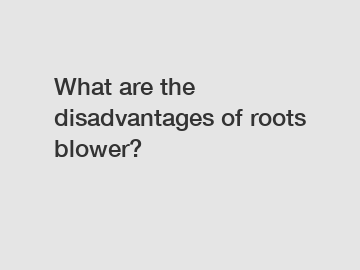Apr. 03, 2024
Goto Benyuan to know more.
Roots blowers are widely used in various industries for applications such as pneumatic conveying, wastewater treatment, and gas boosting. These blowers are known for their high efficiency and reliability, making them a popular choice for many businesses. However, like any piece of equipment, roots blowers also have their disadvantages that need to be considered before investing in them.
One of the main disadvantages of roots blowers is their high noise levels. Roots blowers are known for being quite noisy, which can be a problem in industrial settings where noise levels need to be kept to a minimum. This can be a concern not only for the workers who have to operate the blowers but also for those in the surrounding areas who may be affected by the noise. In some cases, additional soundproofing measures may need to be taken to reduce the noise levels of roots blowers, adding to the overall cost of the equipment.

Another disadvantage of roots blowers is their high energy consumption. Roots blowers require a significant amount of power to operate, which can lead to high energy bills for businesses that use them frequently. This can be a major concern for companies that are looking to cut costs and reduce their carbon footprint. In some cases, businesses may need to consider alternative blower technologies that are more energy-efficient in order to reduce their energy consumption and operating costs.
In addition to high noise levels and energy consumption, roots blowers also have a limited range of operating speeds. Roots blowers operate at a fixed speed, which can be a disadvantage in applications where variable speed control is required. In situations where the flow rate needs to be adjusted based on changing system requirements, roots blowers may not be the best option. Businesses that require more flexibility in their blower operations may need to consider alternative blower technologies that offer variable speed control.
Another disadvantage of roots blowers is their susceptibility to heat buildup. Roots blowers generate a significant amount of heat during operation, which can affect their performance and longevity. The high temperatures produced by roots blowers can lead to premature wear and tear on the equipment, resulting in increased maintenance and repair costs. Businesses that use roots blowers should be aware of the heat buildup issue and take measures to prevent overheating, such as installing cooling systems or using heat-resistant materials.
Furthermore, roots blowers are not suitable for handling certain types of gases or materials. Roots blowers are designed for handling clean, dry air and gases, and may not be suitable for applications involving corrosive or abrasive materials. Using roots blowers with incompatible gases or materials can lead to equipment damage and downtime, resulting in additional costs for repairs and replacements. It is important for businesses to carefully evaluate the suitability of roots blowers for their specific application before investing in this equipment.
Despite their disadvantages, roots blowers remain a popular choice for many industries due to their high efficiency and reliability. Businesses that are considering investing in roots blowers should weigh the advantages and disadvantages of this equipment to determine if it is the right choice for their specific needs. By understanding the limitations of roots blowers and taking steps to mitigate their disadvantages, businesses can make informed decisions that benefit their operations in the long run.
For more information, please visit our website.
If you are looking for more details, kindly visit buy roots blower.
Previous: Top Picks: Rotary Screw Blower for Sale
Next: None
If you are interested in sending in a Guest Blogger Submission,welcome to write for us!
All Comments ( 0 )